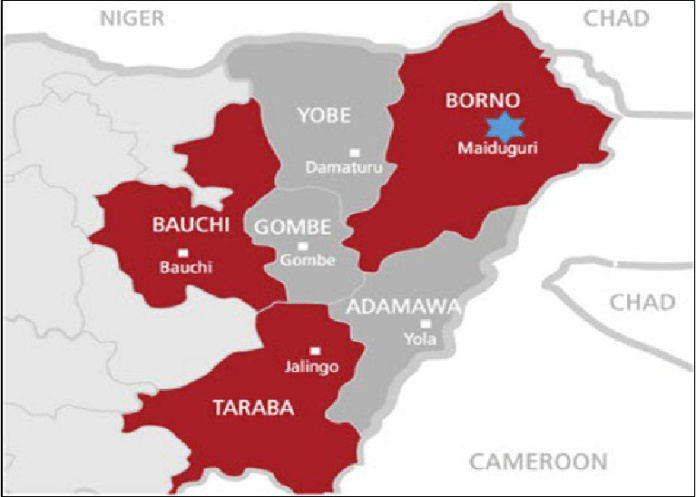The North-East region of Nigeria is grappling with a fresh wave of terrorist activities, drawing widespread concern from retired military officials, human rights organizations, and political groups. These attacks have reignited discussions on the country’s security strategies, with stakeholders calling for immediate and effective measures to stem the violence.
In one of the most recent incidents, suspected Boko Haram and Islamic State of West Africa Province (ISWAP) militants launched brutal attacks on rural communities in Borno State. On Sunday, at least 40 farmers were killed in Dumba, Kukawa Local Government Area. In another harrowing episode, insurgents stormed Shikarkir village in Chibok Local Government Area, setting houses and a church ablaze. The scale and brutality of these attacks have left many questioning the efficacy of the government’s counter-terrorism efforts.
Porous Borders and Military Challenges
Retired Brigadier General Bashir Adewinibi attributed much of the renewed insurgency to the porous borders in the region. He noted that these unsecured entry points have allowed terrorists to move freely and launch attacks with ease. “We need to tighten our borders and ensure that movement in and out of these areas is strictly monitored,” he said, emphasizing the need for a combination of military action and political solutions.
Another military veteran, Brigadier General Aliyu Momoh (retired), acknowledged some successes achieved by the armed forces, particularly during the recent holiday season, which was relatively peaceful. However, he stressed that more needs to be done in terms of funding, equipping the military, and fostering public support. “Our soldiers are doing their best, but they need better tools and resources to carry out their duties effectively,” Momoh added.
Amnesty International and the United Nations Speak Out
Amnesty International has also weighed in, criticizing the current security strategies as ineffective. Isa Sanusi, the organization’s Country Director, commended the military’s efforts to diminish Boko Haram’s large-scale operations but warned that the recent attacks signal desperation among the insurgents. “The killing of farmers is a crime against humanity,” Sanusi stated. “The government must ensure accountability and bring justice to the victims.”
The United Nations has expressed its deep concern over the escalating violence. In a statement, the UN extended condolences to the victims’ families and called for enhanced security measures to protect civilians. It reiterated its commitment to supporting affected communities and urged adherence to international humanitarian laws.
New Restrictions and Local Responses
In response to the deteriorating situation, Operation Hadin Kai, the military operation overseeing security in the North-East, has banned the use of drones in Borno, Yobe, and Adamawa States. Air Commodore U. Idris explained that the move was necessary to prevent unauthorized aerial activities that pose security risks.
Meanwhile, local organizations in other affected regions have called for an expansion of peace initiatives. In Kaduna State, the Birnin Gwari Emirate Progressives Union lauded the federal government’s successful peace efforts in their area and urged that similar strategies be extended to other regions plagued by banditry.
Political Criticism Mounts
Political opposition parties have also seized the moment to criticize the current administration’s handling of insecurity. The People’s Democratic Party (PDP) and the New Nigeria Peoples Party (NNPP) accused President Bola Tinubu’s government of failing to effectively tackle terrorism and banditry. The Labour Party echoed these sentiments, highlighting the under-reporting of security issues despite military efforts.
The resurgence of violence in the North-East is a stark reminder of the challenges facing Nigeria’s security architecture. As the government and military grapple with these issues, the call for a more comprehensive and sustainable approach to counter-terrorism has never been louder. With rural communities bearing the brunt of these attacks, stakeholders agree that swift and decisive action is necessary to prevent further loss of life and restore peace to the region.
This growing insecurity is not just a humanitarian concern but also a national crisis that demands collective action from all sectors of society.

